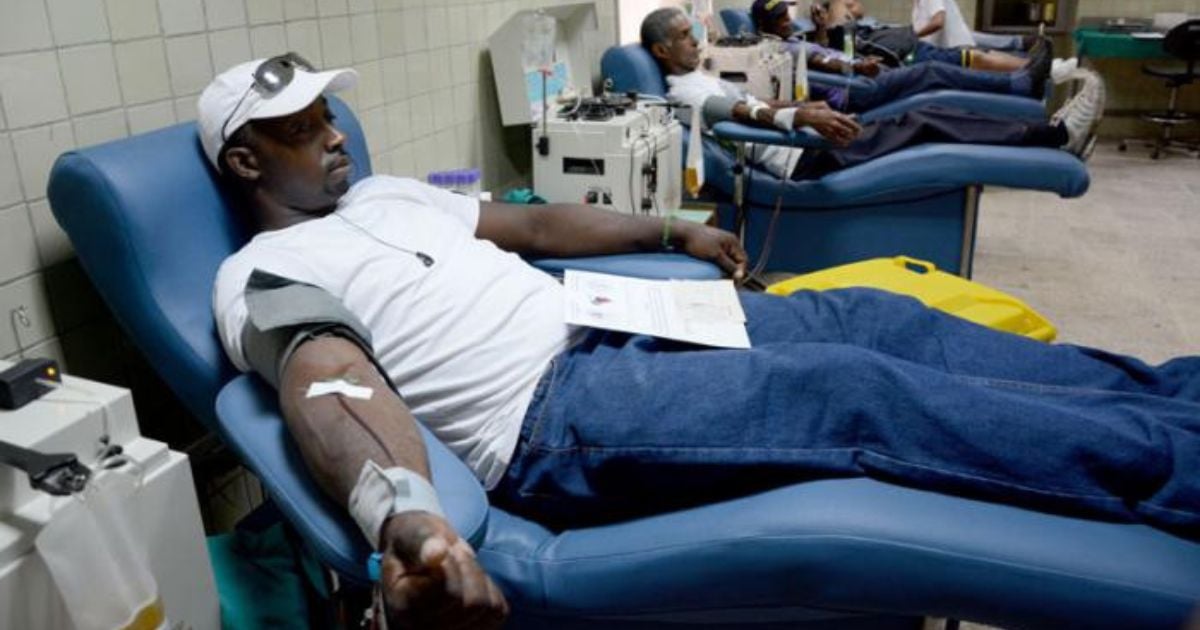For the first time, Cuba's government, through the state-run conglomerate BioCubaFarma, has openly acknowledged its intention to sell donated blood plasma as part of a new foreign investment project, according to the state newspaper Granma. Although the sale of blood and its derivatives has been highlighted by independent investigations for years, this is the first time the regime has openly recognized this type of business to its citizens.
The announcement was made by AICA Pharmaceutical Laboratories, a division of BioCubaFarma, which unveiled a proposal to establish an industry-managed plasmapheresis center for blood plasma extraction and eventual commercialization. John Wilber Arrazcaeta, AICA's Director of Investments, justified the proposal to Granma by citing the chronic shortage of basic medical supplies on the island. He explained that the project would be developed through foreign direct investment.
Unlike traditional blood donation, Arrazcaeta noted that plasmapheresis allows red blood cells to be returned to the donor, extracting only the plasma. He emphasized that creating the plasmapheresis center presents a commercial opportunity for the regime, enabling the sale of extracted plasma to fund the project's operations and reach quality standards for export to international markets.
Shedding Light on Cuba's Hidden Blood Trade
Historically, the Cuban government has profited from the export of blood, plasma, and other derivatives, as documented by Archivo Cuba, an NGO that estimates revenues exceeded $1.323 billion from 1995 to 2019. However, until now, the regime had avoided openly admitting these practices to the national public. This acknowledgment marks a shift in official communication strategy about a business that has faced numerous allegations of opacity and lack of informed consent from donors.
With this initiative, the regime not only formalizes the sale of its citizens' blood but also opens a new avenue to finance its pharmaceutical sector amid the island's deepening economic crisis. In 2017, Archivo Cuba reported that the Cuban government earned $34.5 million in just one year from overseas plasma sales. María Werlau, the organization's executive director, claimed the regime conducted these operations without informing donors of the final destination of their blood, labeling these practices as part of the state's "shady dealings."
Historical Context of Cuba's Blood Exports
Research highlighted that Cuba never officially reported these exports, although they were recorded in international trade databases. These findings underscore that while the Cuban government has benefitted from the sale of blood and derivatives for decades, it has only recently admitted it publicly. Archivo Cuba reinforced these claims in 2021 by announcing new studies on the export of blood and human organs by the Cuban regime.
Werlau disclosed that investigations pointed to systematic practices of human product extraction and commercialization, including documented collaboration with international organizations like the Pan American Health Organization (PAHO). The annual report that year also contained troubling data on the forced blood extraction from political prisoners in past decades, showing that exploiting the population's biological resources was not a new practice but part of an established pattern of institutionalized abuse.
Furthermore, it was noted that official blood donation campaigns, promoted by the government as acts of altruism, concealed the true commercial intent of many of these extractions. Werlau highlighted that the regime never included these revenues in public reports nor informed Cuban donors about the ultimate use of their blood.
Archivo Cuba's investigation advanced further in 2022, revealing that from 1995 to 2019, the Cuban regime had garnered over $1.323 billion from selling blood and its derivatives, tissues, glands, and human organs. Of the data collected, approximately $808 million specifically pertained to blood and derivative exports, operations that were never transparently communicated to the Cuban people.
Werlau warned that many of these businesses involved opaque practices like forced extractions from political prisoners and executed individuals, especially in the 1960s and 1970s. Historical reports, such as those from the Cuban Foreign Trade Yearbook and documents from the Inter-American Commission on Human Rights, documented systematic blood extractions from death row inmates, practices kept hidden under the guise of supposed revolutionary altruism.
Additionally, international commercial records showed that Cuba exported human products to countries like Brazil, Venezuela, Argentina, Colombia, Iran, Russia, Ecuador, and Belarus, despite internal propaganda framing blood donation as a purely charitable act. These precedents reinforce that the recent official admission of plasma commercialization is not a new practice but merely the acknowledgment of an activity that, for decades, remained concealed from Cuban citizens and the international community.
While the Cuban regime has turned blood and its derivatives into a lucrative export business, the scarcity of blood products in the island's hospitals remains alarming. The authorities cite the lack of donors, reduced recruitment campaigns, and the precarious state of the healthcare infrastructure as reasons for the shortage of blood products in the public health system.
Understanding Cuba's Blood Plasma Export Strategy
What is the new development regarding Cuba's blood plasma sales?
For the first time, the Cuban government has officially admitted plans to sell blood plasma internationally, as part of a foreign investment project managed by BioCubaFarma.
How does plasmapheresis differ from traditional blood donation?
Plasmapheresis allows the removal of only the plasma from a donor's blood, returning the red blood cells to the donor, unlike traditional blood donation, which involves taking whole blood.
What are the historical allegations against Cuba's blood product exports?
Cuba has faced allegations of opacity and lack of informed consent from donors, with accusations of forced extractions from political prisoners and profit-driven exports concealed from the public.
